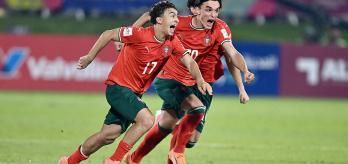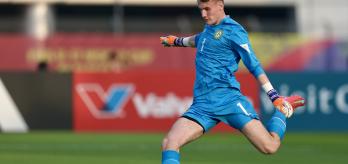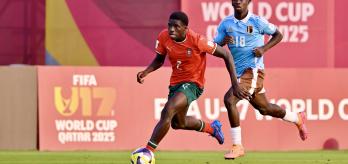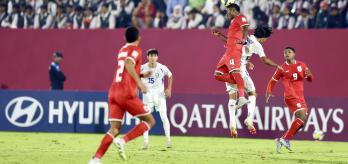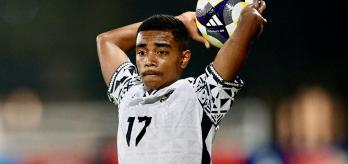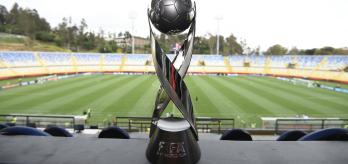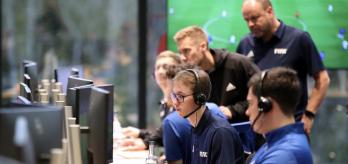Hosted in Qatar’s exceptional Aspire Academy Zone, the festival of football will see the best young players across the world compete to become FIFA U-17 World Champions.
From a FIFA Technical Study Group (TSG) perspective, this format brings a fascinating opportunity. More matches mean a deeper pool of insights — not only about systems of play and tactical intelligence, but also about the technical, physical and mental development of the young players.
Technical Study Group
The new format
A new era commences in youth football development as an annual, 48-team FIFA U-17 World Cup is hosted in Qatar across the next five years. What excites you about this new format?
Pascal Zuberbühler: This is more than just a tournament; it’s the beginning of a new global rhythm in football. The world’s best players, coaches and nations will now meet more often, and that means more data, more stories and more tactical evolution. I can feel the pulse of something special about to unfold.
This format will challenge teams to adapt faster, manage energy differently, and maintain consistency at the highest level, year after year. For goalkeepers, this is a fascinating new landscape. The tempo of the modern game keeps rising, and the demand for goalkeepers who can read, decide and lead under constant intensity has never been greater — how they build up, how they command space, how they anticipate.
Personally, I can’t wait to feel that energy again — the heat, the noise, the tension, and the inspiration that only a World Cup brings. Qatar has proven itself as a world-class football destination, and now it becomes the heartbeat of the global game for the next five years.
More teams mean more players and coaches get exposure to playing at this level. How important is this in their development?
Hérita Ilunga: In a large tournament like this one, players get early exposure to test their technical, tactical and mental progression under pressure. It is great to give so many countries the chance to participate in this adventure of a very high sporting level, and it will help develop them as people.
From my experience across the last three editions of the U-17 African Cup of Nations, the way tournament participation helps players to develop is clear. It is always important for coach development, and I am looking forward to seeing how teams from different confederations approach the competition, with a keen interest in how the African teams compete.
Invaluable playing experiences
The FIFA U-17 World Cup experience gives young players more than just a football education. From your experience of playing in youth and senior FIFA World Cups, how do these tournaments challenge the player to develop?
Simone Gomes Játoba: Players face teams from different continents, with distinct playing styles, tactics and football cultures. This exposure is crucial for developing tactical intelligence and adaptability on the field. Facing different formations and opponents demands that players rapidly evolve their tactical understanding of the game and execute the coaching staff’s instructions.
Matches are also played at a higher pace and level of excellence than most national youth competitions. This forces players to improve their technical skills and decision-making under greater stress. The physical demand of a national team tournament is intense, serving as a test of endurance and preparation for the rigours of professional football.
In short, youth tournaments are more than just games; they are a high-performance laboratory that catalyses athlete development, simulating the conditions of professional football in a controlled environment for improvement.
Having played in a senior World Cup, how did your experience of competing in youth World Cups impact your development as a player?
Damien Duff: Representing your country at any level is a very proud moment, but there is pressure now also, which is a great learning experience. I played in two U-20 World Cups, and they remain some of the greatest days of my life.
The World Cups I played in were markedly different. Malaysia 1997 gave me a platform and made me believe I could play against the best. It was an incredible time, and, to date, we are still the only Irish footballers to have a FIFA World Cup medal, after we narrowly finished third.
Two years later, we went to Nigeria in 1999, expecting to win the tournament, which is an incredible thing to say for any Irish football team. I was one of many first-team players in our squad, but unfortunately, we couldn’t get the job done. It might have been a youth tournament, but I was heartbroken. World Cups at any age are special, so I hope these players enjoy it and seize the day.
Coach Development
The tournament also exposes coaches and their backroom teams to new football experiences and tactical challenges. How valuable is this in their development?
Ives Serneels: As a head coach, I try to take something from all the coaches I work with, and you need to build a staff that promotes a family around the players and the environment for them to win. There are so many football cultures, ideologies and analyses which influence how you think about the game.
Every coach will get exposed to seeing how other nations do things and will be challenged in their own thinking, and that is a great learning curve. The level will be higher than in their domestic league. The pressure of playing for your country is higher, and this experience demands positive leadership from the head coach, not just in a football sense, but in the whole environment around their staff and players.
Aron Winter: The expansion of the tournament is great for global development and will shape future leaders. I am interested in how the coaching staff approach the games. Do they vary their tactical approaches? Can they adapt from game to game? Will countries have patterns in how they play, or will they have different solutions?
What are the expectations of players in this age group? Are the coaches more focused on developing the players? Or do they want to win games? I think the coaches will be looking to win games, but at that age, it’s interesting because it needs to be about both.
National identity and player identity
Each country has its own football DNA, and one of the best things about FIFA World Cups is seeing how individual characters embody and reflect their teams’ characteristics. Team spirit and cohesion are vital in the tournament setting, so how can young players shine in this environment?
Louis Carey: When I was at Southampton, this was a real focus for us. There’s a big variety in performances, and at youth level, you can have more standout individual players than team cohesion, so I am interested to see how this evolves.
How does the group dynamic of the team affect the individual performance? Is there freedom for individual expression? Leadership qualities emerge, and you see how some players come out of their shell and others might retreat into it. As a young player, can you bring your nation’s identity to the fore, while showing your character and super-strength? It will be an amazing experience for all involved.
Aron Winter: All young kids want to be professional players, but they don’t always understand how challenging it can be. Getting to face other players at the top level helps them understand what it takes, and this is invaluable because they don’t get that experience in their domestic leagues.
Also, where are the players coming from? Are they playing locally, and where are they? The experience of playing at a World Cup is going to be a challenge, especially with the volume of games in quick succession. How will this impact on minutes played?
There is a difference in the pressure of playing for your club and playing for your country. Balancing what your team needs and being the best version of yourself on the world stage is a vital learning experience.
Match schedule
The FIFA U-17 World Cup 2025 kicks off on Monday, 03 November, with hosts Qatar facing Italy in the first of 103 matches taking place at the Aspire Zone, while the final, on Thursday, 27 November, will be played at the Khalifa International Stadium in Doha.







